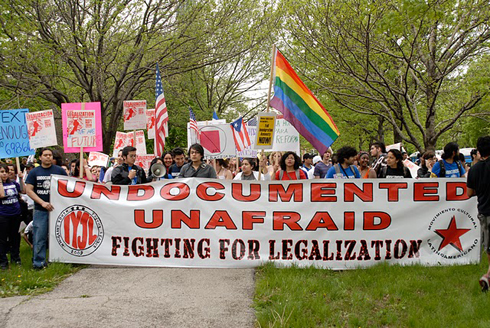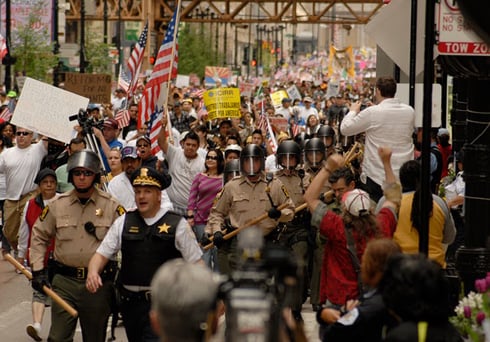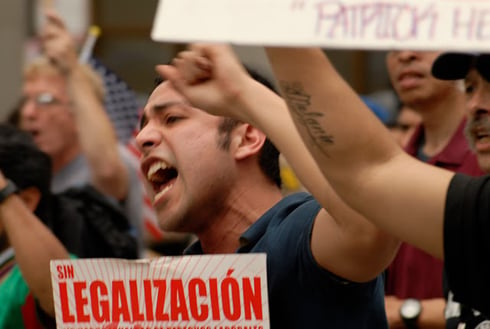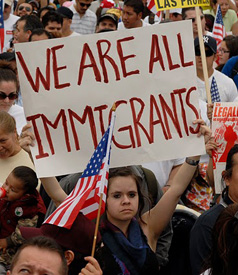Did you know that Truthout is a nonprofit and independently funded by readers like you? If you value what we do, please support our work with a donation.
It was in Chicago in 1886 that a largely immigrant workforce fought, and won, the battle for the eight-hour day. It was in Chicago in 2010 that a modern-day workforce, made up of immigrants and the descendants  of immigrants, came out to fight for their latest demand: comprehensive immigration reform.
During a march from Union Square to downtown Chicago on May Day, more than 10,000 protesters called for a change to laws they see as breaking families and criminalizing the right to work.
They were joined by protesters around the country. Los Angeles saw the highest turnout, with 50,000 people taking to the streets, according to The New York Times. Twenty-five thousand protested in Dallas, and more than 10,000 in Milwaukee. Washington, DC, New York City and Phoenix were also among more than 70 places around the country that held rallies or vigils.

(Photos: Sara Goke / Creation Cinema)
Fueling the energy of the crowds was the recent passage of the SB 1070 bill in Arizona, allowing police to detain anyone they suspect of being in the country without documents, thereby turning the offense from a civil violation into a criminal one.
As tens of thousands of people marched, Congressman Luis Gutierrez (D-Illinois) was arrested along with 34 other activists in Washington, DC, following an act of civil disobedience when he sat down and refused to move at police orders. Gutierrez wore a shirt saying, “Arrest me, not my friends.”
Students in Washington, DC, and Ann Arbor, Michigan held mock graduation ceremonies to underscore the plight of the estimated 65,000 undocumented teenagers brought to the country as minors who are expected to graduate from high school this spring, but face innumerable barriers to higher education and no path to legalization.
In Ann Arbor, more than 500 people participated in the demonstration near the site of President Barack Obama’s University of Michigan commencement speech. According to The Detroit News, all of the students participating were undocumented.

(Photos: Sara Goke / Creation Cinema)
In Chicago, the Rev. Jesse Jackson joined labor and community leaders in decrying the state of immigration and immigration reform. Jackson compared Arizona today to Selma in the 1960s, drawing a parallel with what many have called the civil rights struggle of our time.
Congresswoman Jan Schakowsky (D-Illinois), a first-generation immigrant, made clear that “Illinois is not Arizona.” Schakowsky, joined by other elected Illinois officials, signed a public statement saying, “we condemn the anti-Latino, anti-immigrant, anti-civil liberties SB 1070.”
Labor leaders stressed the importance of justice for all workers, citing the estimated 1.5 trillion dollars that legalization of undocumented immigrants would generate in the first ten years, according to the Center for American Progress.
The rally also featured calls from African, Asian-American and Polish groups to reform immigration. They stressed this was a problem from which all immigrants, and American citizens in families broken by the immigration system, suffered.
A representative of the Asian-American Institute spoke about her struggle to bring her sister from the Philippines to the United States through legal channels. Her sister’s application is currently not active. “It took more than 24 years and I suffered for it,” she said. “Would you be willing to wait 24 years for your family members to come? Something must be done!”

(Photos: Sara Goke / Creation Cinema)
Another woman who spoke at the rally railed at the injustice of a system in which her daughter had died serving the US military in Kuwait and her husband was now under threat of deportation.
The rally also had the newest faces on the immigrant rights activism scene – those of a new youth movement, the Immigrant Youth Justice League (IJYL), of undocumented activists who grew up in the United States and are now using the tactic of “coming out” to bring awareness to the community about their plight.
“The action of ‘coming out’ is not merely to stand in front of a crowd and confirm a label put on us by the same system that puts us in detention. Coming out is an action that seeks solidarity from our brothers and sisters, and empowers us to confront criminalization,” said Mario, one of the young, undocumented people who spoke at the rally.
Cesar, another undocumented student, said that today he was “putting my life on the line” and risking deportation from the country he came to at the age of two because he could no longer live in fear. He spoke of losing sleep throughout his childhood worrying that his undocumented father would not come home from work, and struggling with his identity in the only country he has known as home – and which calls him illegal.

(Photos: Sara Goke / Creation Cinema)
For many Chicagoans, the resurgence of mass demonstrations, civil disobedience and the results they have already garnered this year – such as the staying of Rigoberto Padilla’s deportation, are victories. But for the IJYL members, it is just the beginning.
Maria-Terese, who came to the country at the age of five, said there was no need to be specific about herself because there were 13 million people like her in the country today. “I want to send a message to all my fellow undocumented people: This is a time to fight for the right that we have been denied for so long. We are not asking for any favors, we deserve this just like anyone else that has contributed to this country,” she said, calling for legalization for all undocumented immigrants. “Please do not follow the mistaken rhetoric that now is not the time, that we are asking for too much, that we need to slow down with out struggle. If we accept this, we accept that we are not equal. And if I know one thing, it is that we are equal.”
Press freedom is under attack
As Trump cracks down on political speech, independent media is increasingly necessary.
Truthout produces reporting you won’t see in the mainstream: journalism from the frontlines of global conflict, interviews with grassroots movement leaders, high-quality legal analysis and more.
Our work is possible thanks to reader support. Help Truthout catalyze change and social justice — make a tax-deductible monthly or one-time donation today.
